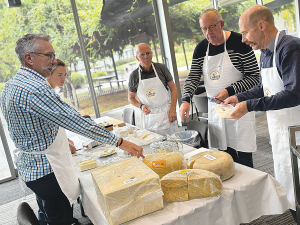Damien O’Connor: NZ united on global trade
When it comes to international trade, politicians from all sides of the aisle are united, says Labour's trade spokesman Damien O'Connor.
 Master Judge Jason Tarrant (left) guiding some of the judges through an evaluation of 253 NZ-made cheeses at Wintec in Hamilton recently.
Master Judge Jason Tarrant (left) guiding some of the judges through an evaluation of 253 NZ-made cheeses at Wintec in Hamilton recently.
Boutique cheesemakers in New Zealand are being forced out of business by several factors, including higher input costs and cheaper imports from the European Union.
And the recent ratification of a free trade deal (FTA) with the European Union by the New Zealand Parliament is expected to allow more cheap EU cheese imports to flood the domestic market.
New Zealand cheesemakers are urging consumers to buy local and help them stay in business.
NZ Specialty Cheese Association chair Simon Lamb told Dairy News that he knows of four cheese companies that have folded in the last 12 months.
Lamb says while there are a myriad of factors affecting the local cheese sector, cheaper imports from the EU is certainly having an effect.
Lamb points out that over the last five years cheese manufacturing in the EU has changed. Whey, a by-product of the manufacturing of cheese is now considered more valuable than cheese. This has led to the manufacture of large quantity of inferior cheese to access whey.
With Covid restrictions over and freight charges stabilising, it appears that more of these cheaper cheeses are finding their way into markets like New Zealand.
Lamb says these cheeses are competing with locally made cheese and creating false expectation from customers.
“For example, for goat milk cheese makers in NZ, just accessing raw milk is costing them $20/ kg. We see these EU cheeses coming in at $30 to $40/kg.
“High input costs like increase in logistics and insurance costs, are pushing margins tighter for smaller operators, who can only increase the price so high before they are forced out of business. And this has started happening.”
He says in the current economic climate supermarkets are also looking closely at their suppliers and small cheesemakers are being priced out. This is also adding pressure on cheesemakers. The association has made submissions to the parliamentary select committee on foreign affairs, defence and trade but isn’t banking on a lot of support from politicians on the EU trade deal.
“We did make our thoughts very clear to the committee, but the bigger picture is that there’s a lot tied to the deal,” says Lamb.
“We will continue to lobby Ministry for Primary Industries and the Government on this issue.”
However, Lamb says for his members the best way to compete with imported cheeses is to keep producing “just as good if not better cheeses”.
“The challenge is to prove to consumers that the brie from France may be cheap, but my brie is much better.”
Last week, the NZSCA awarded 187 medals in the prestigious New Zealand Champions of Cheese Awards.
Master Judge Jason Tarrant guided thirty judges through an evaluation of 253 NZ-made cheeses. Tarrant said the intense judgement affirmed the exceptional quality of locally made cheese.
Lamb says while the number of entrants was nearly the same as previous years, the quality of cheeses entered this year was better than previous years. He says NZ cheeses have also done well on the international stage in the past few years.
“As a small cheesemaking group, NZ is punching well above its weight globally,” he says.
“If we don’t protect our cheesemakers, then we will lose them.”
OPINION: The past few weeks have been tough on farms across the North Island: floods and storms have caused damage and disruption to families and businesses.
European dairy giant Arla Foods celebrated its 25th anniversary as a cross-border, farmer-owned co-operative with a solid half-year result.
The sale of Fonterra’s global consumer and related businesses is expected to be completed within two months.
Fonterra is boosting its butter production capacity to meet growing demand.
For the most part, dairy farmers in the Waikato, Bay of Plenty, Tairawhiti and the Manawatu appear to have not been too badly affected by recent storms across the upper North Island.
South Island dairy production is up on last year despite an unusually wet, dull and stormy summer, says DairyNZ lower South Island regional manager Jared Stockman.